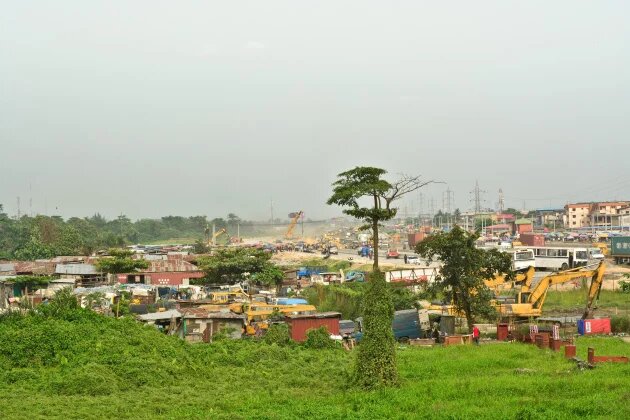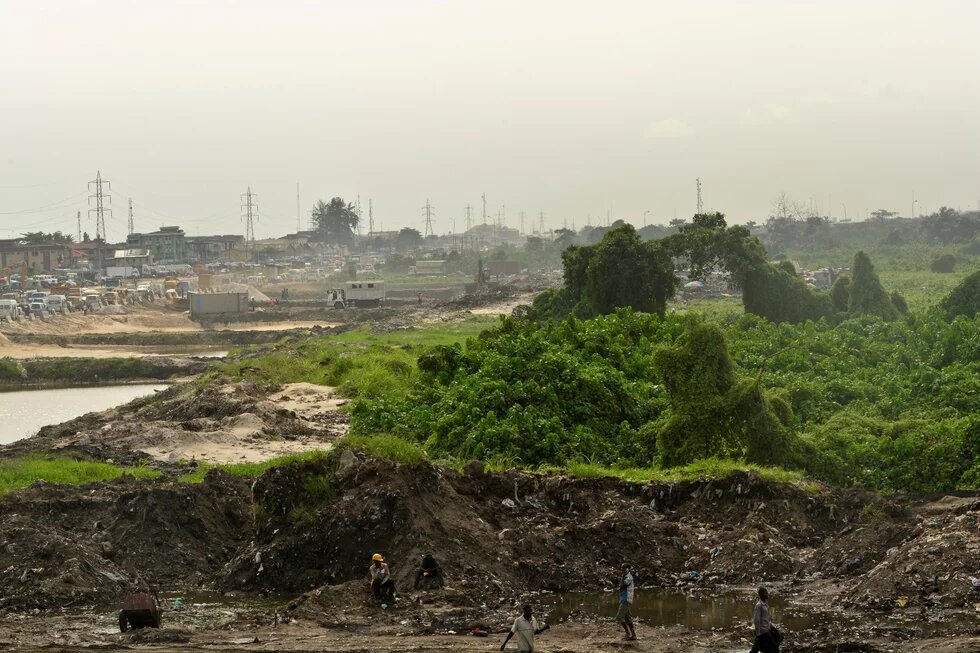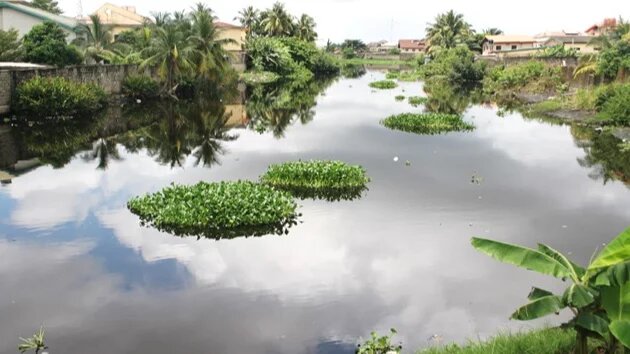

A local government should be the closest government to the people but in Nigeria it only has minimal implementation power. This is the experience of the organization Community Conservation and Development Initiatives (CCDI). In their climate change training programmes and various initiatives aimed at building local adaptative capacity for climate change resilience at local government level, they realized that initiatives and planned actions are constrained and hampered by poor land use planning and lack of integration of climate change factors into development agendas. In a participatory research project in Amuwo Odofin Local Government they critically analyzed the scope of actions assigned to local governments compared to state governments on existing land use policies, regulations and laws and developed a participatory risk reduction and management blue print.
In Nigeria the role of local government is usually discussed in terms of how its proximity to ‘the people’ is of vital importance in responding to their needs. But in the course of carrying out a project on climate resilience in local governments, Community Conservation and Developmnt Initiatives (CCDI) found this not to be quite so true, as a overlapping legal and administrative power or the non-adherence to clearly defined responsibilities between the different tiers of government make it very difficult for a local government to live up to its role in the provision of essential services, development planning and ensuring a safe and healthy environment.
In a case study at Amuwo Odofin Local Government (AOLG) which has shown a leadership role in creating awareness about climate change and trying to mainstream climate adaptation into its plans and activities, the decision making powers of local governments to shape land use regulations and policies in comparison to the powers at the state level were analysed. It is one of the very few local governments in Nigeria to have a functioning climate change unit. The study focused on five priority planning areas of concern which can improve environmental quality in the local government. Wetland Conservation and Restoration; Flood Shelters and Evacuation Routes; Environmental Impact Assessments; Waste Management; and Public Spaces.
During multi-disciplinary and multi stakeholder focus group discussions, residents expressed the feeling that the master plan for the area had been overrun and that government agencies were trampling on the rights of the people, increasing the vulnerability of the local government and its residents to climate change and other disasters.
A huge demand in Lagos for real estate has led to large areas of the local government’s wetlands being sold off; the loss of this natural drainage has left communities increasingly vulnerable. A dispute exists between the Federal government and the State government over lands in the area that have been designated as wetlands and riverine areas. Whilst the local and state government wish to protect wetlands as a buffer zone, the Federal government in the form of the Federal Housing Agency, responsible for the management of FESTAC estate, is not in line with this thinking. Given the environmentally sensitive geographic location of the local government with its threatened wetland and coastal areas, due regard should be given to the existing land use before any development is considered. Where development is needed and found appropriate, the law requires that Environmental Impact Assessments (EIA) are submitted and approved by the relevant authorities to stop, decrease or counteract the significant adverse environmental effects and a key feature of a good EIA is public participation. Obviously local governments are not clear about how they should approach the EIAs. which should actually be conducted and verified with the assistance of the authority nearest to the location of projects, which is the local government. One of such areas where Environmental Impact Assessments were not undertaken in Amuwo Odofin are the many roads within the local government which were built at a much higher level than the surrounding housing estates leading to flooding.
Another problem contributing to the persistent flooding is the centralisation of waste management at State government level through its agency LAWMA (Lagos Waste Management Authority). Particular challenges exist with the large volume of waste generated and despite having money deducted from its budget for waste management, the local government authorities have to supplement it further by carrying out waste management activities with its own trucks and cleaners, and residents were to still making private arrangements to remove waste.
Community members believe that open spaces have been hijacked by the bourgeoisie and land is regularly being converted from public to private use, and that all three tiers of government are implicated in this. Most of the open spaces in the master plan for FESTAC had disappeared. Residents lack access to fresh air or open spaces, many of the blocks of flats in the housing estates lack even balconies. During the Structural Adjustment Period in the 1980s many people lost their jobs and had no choice but to convert small spaces meant for gardens into commercial spaces, as pensions were also inadequate, resulting in a proliferation of container shops, from which the government collects ground rent. Today, the local government lacks sufficient motor parks, market and recreation spaces, and adequate open space required for natural systems to provide important environmental services. The dilemma is how to regain open spaces for these uses. Open land has either been lost to the private sector or the status is unclear. Public and open spaces are vital to the health and well being of any community and a necessary part of disaster risk reduction plans. Interestingly the local government authorities in Amuwo Odofin had even been ordered by the State Government agency responsible for green spaces in Lagos LASPARK to stop landscaping within the local government area.
All these practical examples reveal that the powers of a local government to make changes in its priority concern areas, especially with regard to waste management, wetland restoration and open spaces, are in conflict with certain State laws. Especially the new “Lagos State Urban and Regional Planning and Development Law 2010” has left local governments unclear on how to proceed with Environmental Impact Assessments.
Although the laws of the Constitution should always prevail over laws enacted by lower tiers of government, there is little evidence of the local governments challenging anomalies. These conflicting laws do undermine their ability for successful climate resilience planning but there are still a variety of ways in which they can influence land use planning. For example, a local government can apply to LAWMA for a license to manage waste through a body or company established by it for this purpose. If it wishes to conserve and restore wetlands, build flood shelters and evacuation routes, conduct environmental impact assessments and create public spaces it will have to apply to the relevant authority of the state or federal government if that land comes under the jurisdiction of those tiers of government.
For local governments by- laws can greatly assist with climate change adaptation polices, as they set out standards expected of residents and visitors alike and can make the community a better place to live in. The Local Government’s Legal Department in Amuwo Odofin e.g. confirmed that it makes by-laws, though the local government does not presently have specific bye-laws relating to the wetlands, flood shelters, open spaces, evacuation routes and the conduct of environmental impact assessment. It’s existing by- laws, which were drawn up to protect the environment, could be assessed for their current effectiveness in climate resilience, and if necessary changes could be made to existing ones and new ones created if necessary. The big problem is that its by-laws have not been gazetted by the State Government and they are therefore not judiciable, which means they are not accepted in a court of law and therefore there is no authority over the enforcement of them. This issue appears to cut across all local governments, as the Lagos State government wishes to harmonise all by- laws within the state, and very long delays exist in getting them gazetted. It is clearly having a negative impact on local governments leaving them legally and politically hamstrung. Since the local government should be legally empowered to manage environmental protection, its councillors and House of Assembly representatives, elected by the community, should utilise their powers to ensure that the local government can carry out functions that will protect their communities from climate change threats. Driving forward an urgent demand for by- laws to be gazetted is just one example of what these elected representatives could do.
Complaints about the local government’s powers to protect its environment being undermined by the actions of higher authorities are a common feature in Lagos. Mechanisms that could be used to discuss these matters with various State and Federal agencies for waste, environmental protection and emergency management appear to be unclear and ill defined. The establishment of clear and regular engagement platforms between all three tiers of government for resolving such issues would go far in providing greater clarity.
Robust community action, especially with regard to public spaces, might be the most potent method for bringing about change. Existing structures are in place for community participation, such as community development and residents associations, but for meaningful action they need to be strengthened. Poverty and insecurity seem to have prevented greater agitation for community rights in the past decades.
Almost all the focus areas cut across one another; this indicates a need for collaboration, partnerships, planning and better communication, not just between local government departments but also between actual local governments. They share common challenges and some of the issues are transboundary, and so should form coalitions to strengthen their negotiating abilities in achieving better climate protection for their communities and proper implementation of risk reduction plans.
It’s a vital importance of having detailed records, data collection and monitoring, the key benefits of research and advocacy at local government level, and serious engagement with private sector must occur to enable implementation of climate risk reduction plans. Local government officers must improve their knowledge of the rights and powers given to local governments in land use and environmental regulation matters and how to apply to the relevant higher authorities when necessary. They can network together on common issues and challenges and be more proactive in engaging with State and Federal government to reduce climate risks and plan for long term community based resilience. The future for climate change adaptation is complex and planning should be for a range of potential futures.
LINKS
